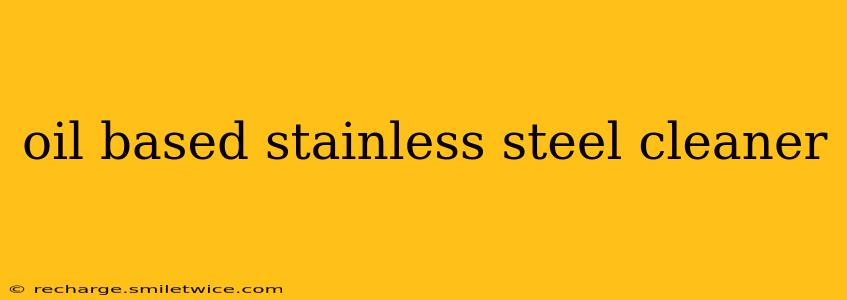Stainless steel is a ubiquitous material in modern kitchens and beyond, prized for its durability and sleek appearance. Maintaining its shine, however, requires the right cleaning approach. While many opt for water-based cleaners, oil-based solutions are gaining traction, promising a streak-free finish and enhanced protection. But are they truly effective and safe for all stainless steel surfaces? Let's delve into the world of oil-based stainless steel cleaners, exploring their benefits, drawbacks, and best practices.
What are Oil-Based Stainless Steel Cleaners?
Oil-based stainless steel cleaners utilize oils, often mineral oil or specialized blends, as their primary cleaning agent. Unlike harsh chemical cleaners, they work by lubricating the surface, lifting away grime and fingerprints without scratching the delicate finish. Many formulations also incorporate other ingredients, such as citrus extracts for degreasing power or beeswax for added protection.
Are Oil-Based Cleaners Better Than Water-Based Cleaners?
This question doesn't have a simple yes or no answer. The "best" cleaner depends on the specific application and the type of stainless steel.
Advantages of Oil-Based Cleaners:
- Streak-Free Finish: Oil-based cleaners often leave behind a streak-free shine, superior to some water-based cleaners, particularly on brushed or matte finishes.
- Gentle Cleaning: Their gentler formulation minimizes the risk of scratching the stainless steel surface.
- Added Protection: Some oil-based cleaners contain ingredients that leave behind a protective layer, reducing the likelihood of future fingerprints and smudges.
Disadvantages of Oil-Based Cleaners:
- Not Suitable for All Surfaces: They may not be ideal for heavily soiled or greasy surfaces, requiring pre-cleaning with a water-based degreaser.
- Potential for Buildup: Overuse can lead to a build-up of oil residue, attracting more dust and dirt.
- Not Antimicrobial: Unlike some water-based cleaners, oil-based solutions don't typically possess antimicrobial properties, meaning they may not effectively kill bacteria.
What Types of Oils are Used in Stainless Steel Cleaners?
Several oils find their way into stainless steel cleaning products. Common choices include:
- Mineral Oil: A refined petroleum product, it's a safe and effective lubricant, leaving a non-tacky finish.
- Plant-Based Oils: Oils derived from plants, like jojoba or olive oil, offer a more natural alternative, but may be less effective in heavy-duty cleaning.
- Silicone Oils: Often used to create a protective coating, they provide excellent water resistance but may attract dust over time.
How to Use Oil-Based Stainless Steel Cleaners?
The application process is generally simple:
- Prepare the surface: Remove loose debris with a soft cloth.
- Apply the cleaner: Dispense a small amount of cleaner onto a soft, lint-free cloth.
- Wipe in the direction of the grain: Always wipe with the grain of the stainless steel to avoid scratches.
- Buff to a shine: Use a clean, dry cloth to buff the surface to a high shine.
Are Oil-Based Stainless Steel Cleaners Safe?
Most commercially available oil-based stainless steel cleaners are safe for use on most stainless steel surfaces. However, always:
- Test in an inconspicuous area first: This helps to prevent any unexpected reactions or discoloration.
- Check the manufacturer's instructions: Pay close attention to the recommended usage and any warnings.
- Avoid using on porous surfaces: Oil-based cleaners are not suitable for surfaces that absorb liquids, such as wood or stone.
Can I Make My Own Oil-Based Stainless Steel Cleaner?
While you can create homemade solutions using mineral oil and other ingredients, ensure you understand the potential risks and limitations before attempting this. A poorly formulated cleaner may not effectively clean or might leave residue.
What are the best oil-based stainless steel cleaners available?
This is subjective and depends on individual preferences and the specific needs of your stainless steel appliances. Researching reviews from reputable sources can help you find a suitable option.
In conclusion, oil-based stainless steel cleaners offer a viable alternative to traditional water-based solutions, particularly for maintaining a streak-free shine on lightly soiled surfaces. However, understanding their limitations and using them correctly is crucial for achieving optimal results and ensuring the longevity of your stainless steel appliances. Remember to always follow manufacturer instructions and test any cleaner on an inconspicuous area before widespread application.
